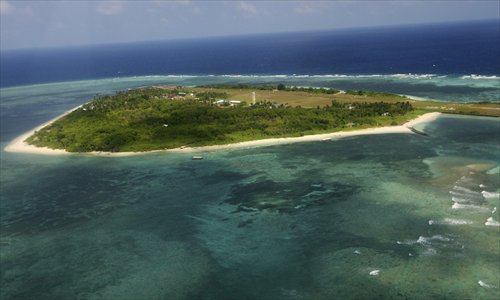HOME >> WORLD
Islands always Chinese
Source:Global Times Published: 2016-4-14 20:13:08
Nation asserts continued rights in South China Sea

An overview of Zhongye Island in the South China Sea Photo: CFP
The Philippine government unilaterally initiated an arbitration case against China in the Hague-based Permanent Court of Arbitration regarding its disputes with Beijing in the South China Sea in January 2013.
On February 19, 2013, the Chinese Government rejected and returned the Philippines' note together with the attached Notification and Statement of Claim, and declared that China will never change its stance on the South China Sea.
A ruling by the arbitration court is expected later this year, reports said.
Meanwhile, China was the earliest country to discover, name and develop the South China Sea, and has been exercising jurisdiction there since ancient times. China has absolute and irrefragable sovereignty about the South China Sea and surrounding waters.
According to written records back to as early as the Qin Dynasty (221BC-206BC), there were navigation and fishery activities in this area. At that time, Chinese residents discovered and named this area as they were frequently navigating and fishing there.
According to international law, the earliest discovery and naming enabled China to legally occupy, develop and control the area. Indisputably, China is the only owner of the South China Sea.
Many written records, evidence and documents from many other countries also prove that the China South Sea has belonged to China since ancient times.
Back in 1933, the "Le Monde Colonial Illustre," published in France, described how "the gunboat Malicieuse discovered three Chinese residents when measuring the Nansha Islands."
The Columbia Lippincott Gazetteer of the World, published in the US in 1961, and the Worldmark Encyclopedia of The Nations, published in 1971, also verify China's sovereignty over the islands in the South China Sea.
The Philippines' territory was delimited by the Treaty of Paris concluded between the US and Spain in 1898, together with all the islands embraced in the treaty concluded at Washington between the US and Spain in 1900, and the treaty concluded between the US and the UK in 1930.
The territory was confirmed again by the Constitution of the Republic of the Philippines in 1935. However, since the 1930s the Philippines has coveted the Nansha Islands, and illegally claimed territory repeatedly.
After 1970s, the Philippines and Vietnam asserted illegal claims of the islands in the South China Sea, and illegally occupied several islands in the Nansha Islands, which violated the basic principle of sacred territory established in the UN Charter, which also broke the territorial arrangements declared by a series of international documents after World War II.
While China experienced a turbulent period in the 1970s, which caused loose management in the South China Sea, the Philippines took islands including Mahuan Island, Feixin Island, Nanyao Island, Zhongye Island, Xiyue Island, Beizi Island.
Later the Philippines issued presidential decrees and amended its constitution, and then publicly declared the occupation of those islands mentioned above, merging them into its alleged territory.
China has committed to facilitating building a fair and reasonable international order under the UN Charter and a series of international documents.
As one of the permanent members of the UN Security Council, China will work with other countries who love peace, pursue justice to maintain the post-war international order and never allow any violation of sovereignty to happen.
Obviously the purpose of the unilateral arbitration proposed by the Philippines is to deny China's territorial sovereignty of the South China Sea, and embolden its illegal occupation of the Nansha Islands.
As the case going, the Western forces hidden behind it have emerged — the US legal team hired by the Philippines.
Shunji Yanai, the Japanese presiding judge of International Tribunal for the Law of the Sea, was actively involved this case, despite the other dispute of territorial sovereignty and maritime demarcation in the East China Sea between China and Japan.
Although the US and Japan publicly say they are neutral about the sovereignty of Nansha Islands, their actions show their stance backing the Philippines.
As the Minister of Foreign Affairs of China Wang Yi said, "History will eventually prove who is just passing through, and who is the real master."
Posted in: Asia-Pacific